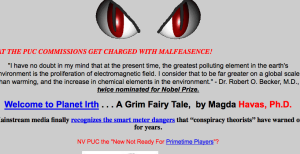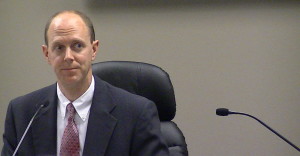Talking to Patrick File’s media-law class the other day, I used the recent incident of a trespassing arrest at a Public Utilities Commission hearing as an example of the often-messy process of figuring out the responsibilities of government to operate in the open.
Since last posting about it, I’ve talked with Carolyn Tanner, the PUC attorney who advised on the situation involving Angel DeFazio, who was trying to record video of a contested case before Commissioner David Noble.
In addition, the Las Vegas Review-Journal called for Noble to resign in an editorial headlined ‘Public Utilities Commisar.’
To my chagrin, when I asked the UNR students for a show of hands, about two-thirds of the room had more sympathy for the PUC than DeFazio. The remaining third didn’t have an opinion. I didn’t see anybody’s hand raised in sympathy for DeFazio.
Let me begin by saying I now understand the reasoning behind Tanner’s comments that the hearing wasn’t a violation of Nevada’s open meeting law.
As she explained to me, the statute (NRS 241) covers public bodies of two or more people when a quorum is present. This incident occurred during a hearing at which Noble was the presiding officer, and no other commissioners were present.
The PUC then turned to Nevada Administrative Code 703.105, which allows the commission to be guided by court rules when a specific regulation or statute doesn’t apply. So Tanner and the PUC referenced the Nevada Supreme Court’s rules on electronic coverage, which I helped put together a few years ago.
The question was whether DeFazio had the right to record video at the hearing. The Supreme Court rules suggest she did, but it does get a bit messy.
Tanner and DeFazio exchanged emails a few days before the hearing, when DeFazio was informed she wouldn’t be allowed to shoot video. The discussion was in the context of DeFazio’s previous complaints to the PUC that she is so sensitive to the indoor environment she sometimes can’t sit in the same room during a PUC meeting.
Her reason for having a video camera in a meeting, she explained to me, was to be able to watch the hearing later. But the PUC already has made accommodations for DeFazio to sit in another room, with a video link, to watch meetings. The Attorney General’s Office had agreed that was a reasonable response to her complaint under the open-meeting law.
I found out during the class discussion, from a student who had worked for the Nevada Legislature’s audio-video department, that similar arrangements had been made for DeFazio during legislative hearings.
It apparently wasn’t until the day of the hearing that the PUC found out DeFazio became a member of the media. She had made an arrangement with Vegas Voice, a senior-citizens publication, to cover the PUC as a volunteer stringer. When she was told she couldn’t record the meeting, she called an editor there and had her confirm the arrangement to the PUC.
That, however, didn’t change Noble’s decision to bar her from recording. Las Vegas Metro police were called, and she was cited for trespassing.
If we go back to those Supreme Court rules, however, the definition of a news reporter is purposely broad: “’News reporter’ shall include any person who gathers, prepares, collects, photographs, records, writes, edits, reports, or publishes news or information that concerns local, national, or international events or other matters of public interest for dissemination to the public.”

DeFazio has been publishing a web site about the PUC for some time now. It fits that broad definition, even with its comparison of commissioners to Hitler.
She hadn’t made a formal request to record video at least 24 hours in advance, as the rules require for a courtroom. On the other hand, Noble didn’t make findings on the record as to why he was prohibiting her from recording.
DeFazio, described as a ‘gadfly’ in the Review-Journal headline, is at least that. She is annoying, critical, apparently can be rude and offensive. In short, to some, she can be quite disagreeable.
For defenders of the First Amendment and advocates of open government, those are the kinds of people who test the limits of our patience. As I told the students in File’s class, professional reporters don’t like to be associated with such blatant activists. Many times as a reporter, I rolled my eyes when a gadfly stood up to speak during public comment and, for the umpteenth time, made a passionate and usually irrelevant speech.
And those are the people we must defend.
I suspect some of the folks at the PUC don’t want DeFazio to record video because they think she’s gone too far. She’s wasting their time, the taxpayers’ money and resources, and the patience of most everybody at PUC hearings and meetings.
But that’s clearly not enough to bar her. In fact, that’s exactly a reason they can’t bar her.
If she were, indeed, disrupting of the proceedings, then a case could be made. But from what I can tell, it was the decision to prohibit her and then call the cops that disrupted the hearing for hours.
Going forward, I don’t think the PUC has any standing to deny her from recording video, either during regular PUC meetings under the open-meeting statute or during contest-case hearings under the Supreme Courts rules on electronic coverage.
“Under these rules,” according to the Supreme Court, “there is a presumption that all courtroom proceedings that are open to the public are subject to electronic coverage. A judge shall make particularized findings on the record when determining whether electronic coverage will be allowed at a proceeding, in whole or in part.”
Clearly, both the meetings and hearings are open to the public. And while the hearings are being conducted by an individual commissioner, the findings being made significantly influence the decisions made later by the full commission.
Here’s what the PUC’s regulations say: “Except as otherwise provided in subsection 4, if the Chair appoints a hearing officer to preside over and conduct any proceeding involving an application, a petition or a complaint, after the close of all evidentiary hearings in the matter, the hearing officer shall file with the Commission a proposed order that sets forth the findings and conclusions of the hearing officer and the reasons and bases for those findings and conclusions.”

Yes, the full commission will vote on the proposed order. But the deliberation and decision-making has largely been done already by the commissioner who conducted the hearing. If that’s not the definition of a rubber stamp, I don’t know what is.
Does the Public Utilities Commission have another option? Yes.
Written into its code is the authority to throw people out of meetings and hearings.
“Contumacious conduct by any person at any hearing before the Commission or a presiding officer is a ground for the exclusion of that person from that hearing and for summary suspension of that person from further participation in the proceedings.”
In case “contumacious” isn’t in your everyday vocabulary, it means “stubbornly disobedient or rebellious,” according to Merriam-Webster. Another dictionary, Oxford, calls it “willfully disobedient to authority.”
Yes, I think Angel DeFazio probably fits the definition of contumacious from time to time in her dealings with the PUC. But I also see a broad, subjective power for commissioners to abuse their authority by excluding people who disagree with it.
Going forward, I think the PUC should allow DeFazio to video record hearings.
If not, it needs to make specific findings — case by case — on why it isn’t going to allow her, or any other ‘news reporter,’ to record the proceedings.
I don’t think there’s any need for new regulations or procedures. The issue is larger than the PUC or DeFazio, and it came to a head only because the PUC forced the issue.
The UNR students who felt more sympathetic to the PUC, I think, were reacting more to DeFazio’s behavior — I showed them the Hitler poster on her web site, the video of her asking police to handcuff her so it would look more dramatic, her history of contumacity — than to the free-speech and open-government principles involved.
I hope they left with a better understanding, though, of the reasons we sometimes defend outrageous behavior by a few on behalf of the broader rights of many.
 Nevada Press Association The best in Nevada journalism since 1924
Nevada Press Association The best in Nevada journalism since 1924